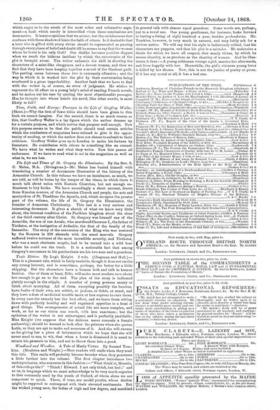Woodland and Woodbee. A Tale of Manly Virtue. By Samuel
Tom- kins. (Houlston and Wright.)—Most readers will smile when they read this title. This smile will probably become broader when they penetrate a little further into the volume. The first chapter introduces two undergraduates, who converse in this fashion :—" What think'st, Horatio, of this college life ?" "Think l Edward. I not only think, but feel ;" and so on, in language which we must acknowledge to be very much superior to that commonly used by the youth of Oxford, of whom alone we are competent to speak. These, if true, are model youths, whose diction might be supposed to correspond with their elevated sentiments. Bat the wicked young men, the ladies of high and low degree, and mankind in general talk with almost equal grandeur. Same words are, perhaps, put to a novel use. One young gentleman, for instance, looks forward to having a living of eight hundred a year, besides prebendaries. Mr. Tonskins, however, is very much in earnest, and may fairly ask for & serious notice. We will say that his style is ludicrously stilted, that his characters are puppets, and that his plot is a mistake. He maintains a thesis for which we have all respect, that manly virtue, by which he moans chastity, is as precious as the chastity of woman. And he illus- trates it thus :—A young nobleman wrongs a girl, marries her afterwards, and lives happily with her. Meanwhile, the girl's virtuous young lover is killed by her shame. Now, this is not the justice of poetry or prose. If it has any moral at all, it has a bad one.


































 Previous page
Previous page